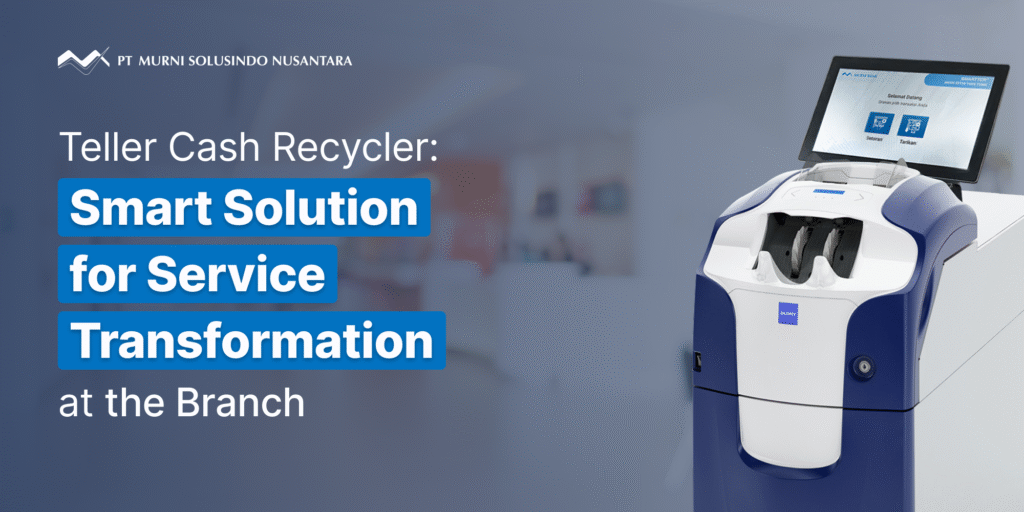
Teller Cash Recycler (TCR) is a key supporting element for cash handling processes at the frontline of the banking industry, especially amidst Indonesia’s rapid development of automation technology. However, why does the TCR remain vital and relevant, even in an era dominated by digital payment methods?
The High Volume of Cash-based Transactions in Indonesia
Despite the growing popularity of cashless transaction methods in major cities, cash still plays a significant role in Indonesia’s banking ecosystem. This continued reliance on physical currency is primarily driven by various factors, including Indonesia having a substantial unbanked and underbanked population. Many regions also lack robust digital infrastructure, and financial literacy initiatives are still ongoing.

Image source: Freepik
According to the Visa Consumer Payment Attitudes 2023 study, up to 80% of respondents continue to use cash as a payment method. This is especially true for everyday purchases such as fuel, convenience store items, and food and beverages. The combination of these demographics, infrastructure gaps, and existing consumer habits ensures cash remains a vital part of daily transactions across the country.
Challenges for the Banking Industry
The high volume of cash transactions presents distinct challenges for the banking industry, particularly for frontline staff who directly interact with customers. Manual cash handling often comes with its own set of difficulties: it’s time-consuming, prone to errors, and carries high security risks.
This is where the Teller Cash Recycler (TCR) emerges as a revolutionary innovation, transforming how banks manage cash at the front lines.
Understanding Teller Cash Recycler (TCR): Quick Definition & Basic Functions
Simply put, Teller Cash Recycler (TCR) is an automatic cash deposit and withdrawal machine specifically designed to simplify and accelerate the tasks of a bank teller. Unlike a conventional banknote counting machine, TCR boasts the more advanced and integrated capabilities.
The basic functions of a TCR include:
Cash Deposit
TCR accepts cash deposits from customers, then automatically verifies the authenticity and counts the denomination of each note.
Secure Storage
Verified cash will be securely stored within the TCR’s internal cassettes.
Cash Withdrawal
When a customer wishes to withdraw cash, TCR will accurately dispense the requested amount from its internal storage.
Sorting and Verification
TCR can sort cash by denomination and condition (FIT for circulation or UNFIT), while also detecting counterfeit money using its advanced sensors.
Automatic Reporting
Every cash transaction processed by the TCR is digitally recorded, minimizing the need for manual entries and streamlining the reconciliation process.
A Brief History and TCR Implementation in Indonesia
The concept of automated cash handling machines has existed for decades, but modern TCRs, with their advanced cash recycling capabilities, have only rapidly evolved in the last two decades. This technology initially gained popularity in mature banking markets and has since expanded to various other countries, including Indonesia.
In Indonesia, TCR adoption shows a significant upward trend, particularly among large banks prioritizing operational efficiency and enhanced security. The demand for banking automation solutions like TCR continues to grow in line with banks’ commitment to optimizing branch services.
How Does a TCR Work: A Closer Look
The operational mechanism of a TCR is based on a series of precise automated processes. When cash is inserted:
- Advanced detection sensors scan each banknote to identify its denomination, physical condition, and authenticity. Counterfeit notes or those rejected (e.g., due to severe tears) are automatically separated by the machine through the reject tray.
- Accepted banknote is sorted and stored in different internal storage cassettes according to its denomination. Cash recycling capability is a core benefit of TCR; so, freshly deposited cash from one customer can be directly used for withdrawal transactions by another customer.
- Every cash movement (in and out) is digitally recorded and integrated with the bank’s core system, enabling accurate real-time monitoring and reporting.
Benefits of TCR for Banks: Beyond Efficiency
Implementing a TCR brings a profoundly transformative impact on banking operations. Here are some of its primary benefits:
Increased Efficiency and Speed of Cash-based Transactions
TCR significantly reduces the time tellers spend manually counting and verifying cash. Deposit and withdrawal transactions can be completed in mere seconds. TCR can also be implemented in a customer-facing setting, enabling tellers to assist more customers at once. This directly leads to shorter customer queues and increased transaction throughput at the branch.

Image source: IBS
Enhanced Security in Cash Handling
TCR machines minimize cash exposure at the teller counter by providing a secure internal storage system within the device. This significantly reduces the risk of robbery and theft. Furthermore, advanced counterfeit detection features protect banks from financial losses due to counterfeit banknotes.
Minimizing Human Error
The TCR eliminates the potential for counting errors that often occur with manual handling. Its accuracy ensures that cash balances are always correct, minimizing discrepancies and the time spent on end-of-day reconciliation.
Optimizing Cash Handling Cycles within the Bank
With its cash recycling feature, TCR reduces the amount of cash that needs to be refilled from the vault or transferred from a cash center. This leads to the optimization of cash inventory at the branch, reducing the need for manual cash replenishment while also lowering the frequency and cost for Cash-in-Transit (CIT).
Supporting Digital Banking Transformation
Although a TCR handles physical cash, its presence strongly supports digital transformation strategies. By automating routine cash management tasks, tellers have more time to interact with customers, offer digital products and services, and act as financial consultants.
This enables bank branches to function as more modern, customer-oriented service centers, rather than just places for cash transactions.
A Strategic Investment for Superior and Competitive Banks
The Teller Cash Recycler (TCR) is no longer just an optional addition; it’s an essential strategic component for modern banking operations. Its ability to optimize efficiency, enhance security, and drive cost savings makes the TCR highly significant for banks aiming to remain competitive and relevant in the digital age.
As a digital business solution enabler with over 33 years of experience and an official distributor of TCR solutions, PT Murni Solusindo Nusantara is committed to delivering innovative solutions tailored to the specific needs of Indonesian banks, helping them achieve smarter and more efficient branches.
Interested in learning more about how TCR solutions can revolutionize your bank branch operations? Visit this page or contact our sales team via hotline 1500 913 or email at tcr@murni.co.id now for further consultation!
References
DBS Bank. (n.d.). Indonesia has the fourth largest unbanked population in the world: Here’s how Bank DBS Indonesia promotes financial inclusion. Retrieved July 8, 2025, from https://www.dbs.com/newsroom/. Independent Banker. (2017, November 1). Timeline: 180 years of banking technology. https://www.independentbanker.org/article/2017/11/01/timeline-180-years-of-banking-


